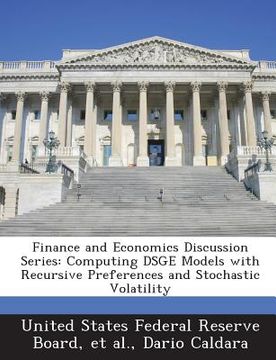Compartir
Finance and Economics Discussion Series: Computing Dsge Models with Recursive Preferences and Stochastic Volatility (en Inglés)
United States Federal Reserve Board
(Autor)
·
Dario Caldara
(Autor)
·
Bibliogov
· Tapa Blanda
Finance and Economics Discussion Series: Computing Dsge Models with Recursive Preferences and Stochastic Volatility (en Inglés) - United States Federal Reserve Board ; Et Al ; Caldara, Dario
S/ 95,80
S/ 191,59
Ahorras: S/ 95,80
Elige la lista en la que quieres agregar tu producto o crea una nueva lista
✓ Producto agregado correctamente a la lista de deseos.
Ir a Mis Listas
Origen: Estados Unidos
(Costos de importación incluídos en el precio)
Se enviará desde nuestra bodega entre el
Lunes 29 de Julio y el
Miércoles 07 de Agosto.
Lo recibirás en cualquier lugar de Perú entre 2 y 5 días hábiles luego del envío.
Reseña del libro "Finance and Economics Discussion Series: Computing Dsge Models with Recursive Preferences and Stochastic Volatility (en Inglés)"
This paper compares different solution methods for computing the equilibrium of dynamic stochastic general equilibrium (DSGE) models with recursive preferences such as those in Epstein and Zin (1989 and 1991) and stochastic volatility. Models with these two features have recently become popular, but we know little about the best ways to implement them numerically. To fill this gap, we solve the stochastic neoclassical growth model with recursive preferences and stochastic volatility using four different approaches: second- and third-order perturbation, Chebyshev polynomials, and value function iteration. We document the performance of the methods in terms of computing time, implementation complexity, and accuracy. Our main finding is that perturbations are competitive in terms of accuracy with Chebyshev polynomials and value function iteration while being several orders of magnitude faster to run. Therefore, we conclude that perturbation methods are an attractive approach for computing this class of problems.
- 0% (0)
- 0% (0)
- 0% (0)
- 0% (0)
- 0% (0)
Todos los libros de nuestro catálogo son Originales.
El libro está escrito en Inglés.
La encuadernación de esta edición es Tapa Blanda.
✓ Producto agregado correctamente al carro, Ir a Pagar.

